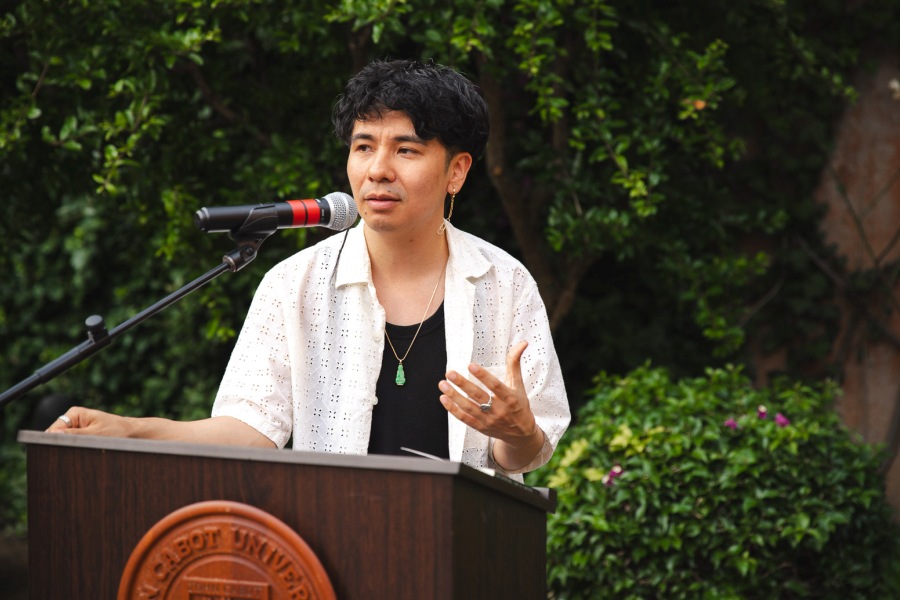JCU Welcomes Douglas Atkin, Former Global Head of Community at Airbnb
JCU welcomed Douglas Atkin, former Global Head of Community at Airbnb, for a talk on the importance of purpose for companies, on March 21, 2023. The talk was held in the context of Professors Ian Roberts and Maria Jell Ojobor’s International Business and International Marketing classes. Airbnb is an online marketplace that connects people who want to rent out their homes with people who are looking for accommodations in specific places.

Douglas Atkin
Atkin was Global Head of Community at Airbnb from 2012 to 2017, at the time of the company’s “hypergrowth.” He began his talk by giving an overview of how Airbnb came to be, starting from its creation in 2008. He explained that when their landlord raised the rent, San Francisco roommates Brian Chesky and Joe Gebbia came up with the idea of putting an air mattress in their living room and turning it into a bed and breakfast. Shortly after, their friend Nathan Blecharczyk joined the startup, which they called AirBed & Breakfast, and then launched the airbedandbreakfast.com website.
The founders had their first customers in the summer of 2008, during the Industrial Design Conference held by Industrial Designers Society of America, where travelers had a hard time finding lodging in the city. The company then went through an acceleration program and started to grow. Currently, Airbnb has over four million hosts, over six million listings in over 100 thousand cities, and more than 150 million users worldwide that have booked over 1 billion stays.
Atkin then talked about how Airbnb became a purpose and values driven community, company, and brand. He explained that when Chesky, Airbnb’s cofounder and CEO, asked him to come up with a purpose for the company, he decided to speak to 485 hosts, guests, and employees to get their input. Then, based on their conversations, he developed Airbnb’s purpose, which is to “Create a world where anyone can belong anywhere.”
According to Atkin, a good purpose has six main ingredients. The first is that it must be grounded in a “universally experienced truth,” so that it’s authentic. It must also “stretch to the stars,” so that it is aspirational and inspirational. The third fundamental aspect is that “it should be about one big thing, and it should be specific enough to give direction but broad enough to do it forever.” Then, Atkin said that it’s important to “declare it and own it, so that you’re held accountable to it.” He added that a good purpose must be memorable, because everyone must know and live it, and lastly, that “it must be lived and operationalized.”
Then Atkin talked about what the team learned during the process of developing Airbnb’s purpose. He said that the company’s purpose must always come first, and that it must lead everything. It must also be used to recruit, review, and reject anyone who doesn’t embrace the company’s purpose and values, including the users, and it must be used and “be seen being used by the company’s leaders.” Atkin added that a good purpose must lead all the big decisions, especially the risky and existential ones, as these end up becoming meaningful moments in a company’s history. In addition, he said that a company needs values, and that they need to be real, and ideally no more than three. It is essential that the purpose and the values govern everything.
Douglas Atkin is the author of The Culting of Brands: Turn Your Customers into True Believers (Portfolio, 2005), a book about “how to build cult-like community around almost anything.” He is Co-Founder of Purpose, an organization that mobilizes millions for social change, and former Board Member of AllOut.org, the world’s largest LGBTQ movement. He is Meetup Fellow and former Partner and Chief Community Officer at Meetup, the world’s largest network of communities. Douglas is also former Brand Strategist and Partner at leading NY and London advertising agencies, and former Chairman of the U.S. Account Planning Group (the professional association of Brand Strategists).





